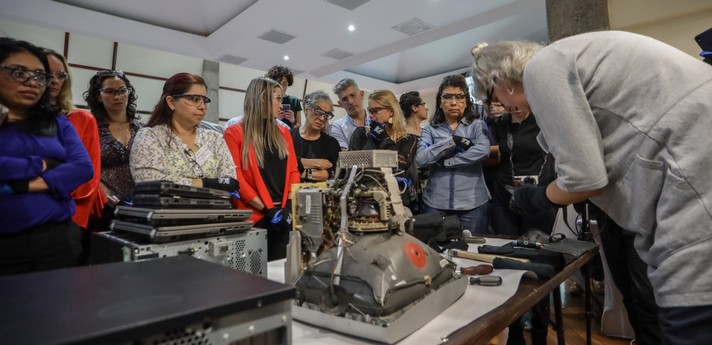First Latin American e-waste report published
January 25, 2022

According to a new report produced under UNIDO’s Latin America and the Caribbean e-waste project, only three per cent of Latin America’s e-waste is reported as collected through formal channels and treated in an environmentally sound manner. There is no certainty about the remaining 97% that may include US$1.7bn in recoverable materials a year.
Regional E-Waste Monitor for Latin-America is the United Nation’s first assessment of the region’s e-waste volume, its legislation and its management infrastructure.
The report was produced by the Sustainable Cycles (SCYCLE) Programme, cohosted by the UN University (UNU) and the UN Institute for Training and Research (UNITAR). It covers the 13 countries participating in the UNIDO-GEF LAC E-waste project: Argentina, Bolivia, Chile, Costa Rica, Ecuador, El Salvador, Guatemala, Honduras, Nicaragua, Panama, Peru, Uruguay and Venezuela.
“E-waste constitutes one of the fastest-growing streams of physical waste in today’s global environment and is a threat to sustainable development,” the report says.
Access to data on e-waste is crucial to tackling this threat and yet few countries collect internationally comparable e-waste statistics.
Co-author, Ruediger Kuehr, Director of SCYCLE, said, “This report was created, with the cooperation of 13 countries, to support and facilitate the environmentally-sound management of e-waste in the region.”
The report finds that electronic waste in the 13 Latin American countries rose by 49% between 2010 and 2019, roughly the world average, but just three per cent was collected and safely man-aged, a fraction of the 17.4% global average. While informal recyclers ‚cherry pick‘ some valuable elements from waste electronics and electrical equipment, most of the remaining 97% is improperly managed.
In 2019, e-waste generated by 206 million citizens in the 13 countries reached 1,300,000 tonnes (1.3 megatonnes, of which almost 30% was plastic) – equal in weight to a 670 km line of fully-loaded 40-tonne trucks. The comparable figure in 2010 was 900,000 tonnes, generated by about 185 million citizens.
The hazardous substances in the region’s e-waste comprise at least 2,200 kg of mercury, 600 kg of cadmium, 4.4m kg of lead, 4m kg of brominated flame retardants, and 5.6 megatonnes of green-house gas-equivalents (due to refrigerants).
These substances “are poorly managed within the region and are likely to be untreated, generating various risks to the stability of a healthy environment,” according to the report.
Meanwhile, “managing e-waste could be an economic opportunity,” said co-author, Kees Baldé, senior scientific specialist at UNITAR SCYCLE. “The e-waste generated regionally in 2019 contained 7000 kg of gold, 310 kg of rare earth metals, 591m kg of iron, 54m kg of copper, and 91m kg of aluminum, representing a total value of roughly US $1.7bn of secondary raw materials.”
All 13 participating countries have some legal and regulatory frameworks for waste management but only Costa Rica, Ecuador and Peru have instituted specific legislation for e-waste and Extended Producer Responsibility (EPR) systems focusing on e-waste regulation.
While “the enforcement of these measures remains a significant challenge”, the report calls on all countries in the region to introduce and enforce either: a) a robust legal and policy framework focused on environmentally sound management of e-waste and persistent organic pollutants (POPs) contained in e-waste, or b) monitor and reinforce existing systems to make them more efficient and effective.
It adds that adequate financing and monitoring of the systems, and the cooperation of all stakeholders, are essential elements for setting up and sustaining successful policies.
Policy development is at the heart of UNIDO’s intervention on e-waste in the region, with two new policy drafts prepared under the UNIDO-GEF project so far, and a further four in development. In addition to this, within the framework of the project, two countries are drafting amendments to existing regulations and a new bill on e-waste is being supported.
The project has also carried out extensive capacity-building and awareness-raising activities across the region and globally, and engages a broad range of stakeholders, including national and local governments, producers, recyclers, NGOs and other civil society organizations, private sector companies, academic institutions and other UN agencies to jointly address the issue of e-waste in the region.
The Strengthening of National Initiatives and Enhancement of Regional Cooperation for the Environmentally Sound Management of POPs in Waste of Electronic or Electrical Equipment (WEEE) project is funded by the Global Environment Facility (GEF) and implemented by UNIDO. The project supports 13 Latin American countries with the strengthening of regional cooperation and knowledge exchange, and provides advice on e-waste policies and regulations, suitable management technologies, business models, capacity-building and awareness-raising.
Source&Credits: https://www.unido.org/news

